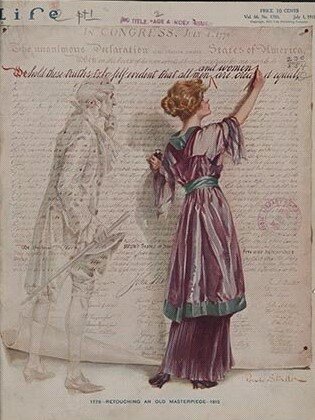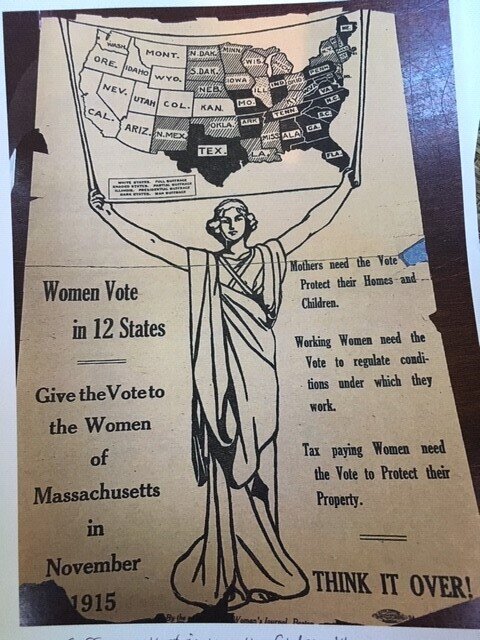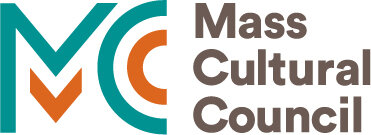
FOR EDUCATORS
ANXIOUS TO VOTE: STUDENTS, WORKERS AND THE FIGHT FOR WOMEN’S SUFFRAGE
A curriculum and public education project, 2020
ACCESS THE LESSON PLAN
PRINT OUT COPIES OF THE TIME CAPSULE FOR YOUR CLASS ROOM
These PDF documents are intended to be printed out on double-sided sheets.
LEARN MORE ABOUT THE CONTENTS OF THE TIME CAPSULE
Ballot Box, Chicago, 1912.
Take a closer look at the objects and documents within the faux 1920 Voting Rights Time Capsule, housed in a ballot box.
The primary and secondary resources below could have been collected by students of Ida and Josephine Hall, long-time educators and activists in the industrial city of Waltham, Massachusetts. They convey stories of struggles and successes from different perspectives of race, class, gender, age and ethnicity, shedding light on the intersection of the women’s suffrage and labor movements.
Ida Hall was the first to organize young working women for the Massachusetts Woman Suffrage Association as early as 1899. Many of her recruits were her students in the Boston Evening Schools who had recently immigrated from Europe and worked in low-paying, low-skill jobs during the day. Hall’s Young Woman’s Political Club in Boston predates the famous wage earners leagues of New York City by nearly a decade.
By late 1907, the NASWA observed “it will not be the educated workers, the college women, the men’s association for equal suffrage, but the people who are fighting for industrial freedom who will be our vital force at the finish.” (Progress, Nov 1907) This was no longer a movement of any single class but one that united people of all economic levels.
In 1903, as many as 3,000 women worked in the Waltham Watch Factory. Massachusetts women suffragists like Waltham’s Florence Luscomb and Amy Acton recruited factory workers during their “noon hour” break through open air speeches, leaflet distribution and interviews.
Dozens of photos of women working in the Waltham Watch Factory are available in Harvard’s Curiosity Collection on Working Women.
Postcard: Waltham Historical Society
This issue describes how teacher Josephine Hall consoled students with flowers when a Waltham high school student died in World War I. Students committed to women’s suffrage received yellow roses.
The full year book is available through the Waltham Public Library
Josephine Hall lived with her sister Ida Hall on Chesterbrook Rd.
This article about women taking over the local press for a day, three of the most active suffragists are shown together in a single image: Ida Hall, her sister Josephine Hall and Florence Luscomb.
Massachusetts textile mill workers might have chosen bobbins of cotton thread to represent themselves and their workplace. This representative photo shows women and children surrounded by thousands of such bobbins.
In Waltham and Lowell, the cotton mills owned by the Boston Manufacturing Company were operated by young mill girls from the start. The BMC mill in Waltham was the first integrated factory in America, established in 1814, nearly a century before this photo was taken.
During the Progressive era, photographers such as Lewis Hine gave Progressive reformers the tools to share the evidence of the harsh reality of child labor. Congress proposed a child labor amendment in 1924, but Massachusetts and other states failed to ratify it, empowering the opposition. Not until 1938, as part of the Fair Labor Standards Act, would child labor be illegal on the federal level. For more information, see: Child Labor in the United States Lewis Hine photo, 1912. National Child Labor Committee Collection, Library of Congress.
Suffragists distributed flyers in many languages to reach foreign-born men and women.
Florence Luscomb Papers. Schlesinger Library, Radcliffe Institute, Harvard University
Progressive reformers did their best to highlight working conditions, especially for women and children, through exhaustive investigations, documented in reports such as this.
For more information, see: United States Children's Bureau
For the full report on Waltham, and a description of the Waltham Evening Schools where Ida Hall taught, see From School to Work
According to American political scientist Larry Diamond, democracy consists of four key elements: a political system for choosing and replacing the government through free and fair elections; the active participation of the people, as citizens, in politics and civic life; protection of the human rights of all citizens; a rule of law, in which the laws and procedures apply equally to all citizens.[9]” https://en.m.wikipedia.org/wiki/Democracy
This Life Magazine cover relates to the biography of Ethel Paine, a great great granddaughter of a signer of the Declaration of Independence. A copy of this document hangs in the Great Hall of her country house in Waltham called Stonehurst.
Library of Congress
Women suffragists were the first Americans to dare to picket the White House. Here, these picketers for the National Woman’s Party, known as silent sentinels, used President Woodrow Wilson’s own words against him.
For more information, see Tactics and Techniques of the National Woman’s Party Suffrage Campaign.
Most historians of women’s suffrage emphasize the impact of WWI on the movement’s increasing success once the United States entered the war in 1917. See: Suffrage and WWI
The modern American democratic experiment was inspired by the political systems of ancient Greece and Rome. Even in these ancient democracies and republics, women could not participate in political life.
This long history of exclusion gave ample fuel to opponents who often treated modern women suffragists with ridicule, as seen in this tongue-in-cheek magazine cover. The central figure with the umbrella represents Susan B. Anthony.
https://en.m.wikipedia.org/wiki/History_of_democracy#Historic_origins
Ida Hall organized this important meeting in Faneuil Hall which brought together young working women and college-educated women. Its diverse body of speakers included labor leader and future WTUL founder Mary Kenney O’Sullivan who pledged her alliance to women’s suffrage for the first time. See Ida Hall’s biography
It can not, nor should it be, denied that some in the movement relied on racist, classist, and elitist arguments for women’s suffrage: Overt Racism after 1890
This illustration in the National Association for the Advancement of Colored People (NAACP) journal The Crisis was created by and for African-Americans. Those who campaigned for women’s suffrage also pursued a campaign against racism.
Anti-suffragists in Boston repurposed this image to support their case against women’s suffrage. Sadly, many women suffragists who were not Black excluded African-American women in order to win support in the South.
Formerly enslaved Emma Jennings lived with a Waltham family who supported women’s suffrage, but her own ideas on the subject are unknown. Famous African-American women who were active in the women’s suffrage movement include Mary Church Terrell in D.C., Ida B. Wells-Barnett in Chicago and Josephine St. Pierre Ruffin in Boston.
For more on this anti-suffrage button, see https://votesforwomen.cliohistory.org
Political buttons have an interesting history of their own: Campaign button
So, it’s not surprising that the women’s suffrage movement would produce a multitude of buttons: http://womansuffragememorabilia.com/woman-suffrage-memorabilia/suffrage-buttons/
For more information on Boston-based labor leader and co-founder of the national Women’s Trade Union League, Mary Kenney O’Sullivan, see: O'Sullivan, Mary Kenney (1864–1943)
O’Sullivan lived in a the Denison settlement house in Boston, which was lead by two Waltham residents: Helena Dudley, Cornelia Warren. Waltham’s Ethel Paine was also involved in Denison House.
Source: Ann Lewis Women’s Suffrage Collection. From the collection of Ann Lewis and Mike Sponder.
Yellow roses—and the colors yellow and gold—were popular symbols of the women’s suffrage movement. The red rose—and the color red—symbolized one’s affinity with anti-suffragists. A debate over the ratification of the 19th Amendment in Tennessee was called The War of the Roses. Symbols of the Women's Suffrage Movement (US National Park Service)
Today, Massachusetts middle school students advocate for the passage of the Equal Rights Act using the moniker The Yellow Roses.
Waltham teacher Josephine Hall handed out yellow roses to her high school students. (See Waltham yearbook, 1919). A large anti-suffrage parade in Boston organized by Waltham’s Evelyn Sears was described by the press as “A Riot of Red Roses.” (Fall River Evening News, Oct 15, 1915.)
Waltham resident and professional tennis player Evelyn Sears briefly led the Massachusetts Anti-Suffrage Association. Like many anti-suffragists, she belonged to one of the wealthiest families in the Massachusetts. However, her equally wealthy cousin Ethel Paine and her sisters quietly supported women’s suffrage. See Evelyn Sears
Boston Globe, April 4, 1913.
Racist, classist, elitist, and nativist arguments were not uncommon in the women’s suffrage movement. For example, see: How Midwestern Suffragists Won the Vote by Attacking Immigrants
Sophia Smith Collection, Smith College.
Suffragists gained the support of influential men like Robert Treat Paine of Waltham through common causes such as international peace. Many prominent women such as Alice Stone Blackwell and Helen Keller of Massachusetts were deeply involved in both the women’s suffrage and world peace movements. See the Women’s International League for Peace and Freedom. .
In addition to running the American Woman Suffrage Association and the Woman’s Journal, Alice Stone Blackwell was the only female board member of the American Peace Society. Her father Henry Blackwell wrote this article for the Woman’s Journal. Ethel Paine, daughter of the Peace Society’s president, was pro-suffrage and an ardent pacifist.
On the other hand, even many suffragists committed to pacifism chose to support the nation’s entry into WWI because they believed that support for the war would help achieve their own goal for a constitutional amendment.
Woman’s Journal May 16, 1896.
For more information on Luscomb, see Florence Luscomb
For her activism in Waltham, see stonehurstwaltham.org/florence-luscomb
Photo: Florence Luscomb collection, Schlesinger Library, Radcliffe Institute, Harvard University
Massive parades were a vital tactic in the women’s suffrage movement, beginning with the famous 1913 parade organized by Alice Paul and Lucy Stone on the eve of Woodrow Wilson’s election. This first large-scale political protest in Washington, DC, drew national attention and sympathy to the cause. The unfortunate mistreatment of women and inadequate police protection ultimately worked in their favor.
https://guides.loc.gov/american-women-essays/marching-for-the-vote
Waltham architect Florence Luscomb and her mother participated in this parade.
Scholar Barbara Berenson describes The Women’s Journal, founded by Lucy Stone and published in Boston from 1870-1917, as “the communications hub for the women suffrage movement.” It is searchable on line. Woman’s Journal
Waltham architects Ida Annah Ryan and Florence Luscomb created many local suffrage floats powered by both by horses and by automobile. This “Victory” float from June 17, 1919 celebrated the return of World War I soldiers just days before the ratification of the 19th Amendment by the Commonwealth of Massachusetts on June 26, 1919.
In 1919, it was still rare for women to drive vehicles.
Photo: Main St., Waltham, Mass. June 17, 1919. Waltham Historical Society. The Waltham Public Library also has two photos of this float.
100,000 of these iconic bluebirds designed by Waltham architect Florence Hope Luscomb were posted on barns, fences and shop windows across Massachusetts as part of a 1915 referendum campaign. These cheery bluebirds, symbols of hope, have come to represent the creativity and resilience of women suffragists across the nation.
Despite an energetic 1915 campaign, the majority of the male electorate in Massachusetts voted against the referendum for a state constitutional amendment to enfranchise women. Defeats in the Northeastern states that November caused suffragists to pivot and focus instead on an amendment to the federal constitution.
National Museum of American History, Smithsonian Institution
From the air, Foley dropped thousands of foreign language leaflets over factory workers in Lawrence, Mass.
For more on Luscomb’s friend, Margaret Foley, see Margaret Foley (suffragist)
Margaret Foley Collection, Schlesinger Library, Radcliffe Institute, Harvard University.
Year after year, Waltham lawyer Amy Acton presented bills to Massachusetts legislature on behalf of the Mass Women’s Suffrage Association and working women and children.
This series of defeats only underscored the need for women’s active participation in politics and strengthened their resolve.
Suffragists and workers joined forces in earnest after the Triangle Shirtwaist factory fire in 1911 brought national attention to the gruesome working conditions of young working-class women, immigrant and native born alike.
https://www.gothamcenter.org/blog/a-vital-force-immigrant-garment-workers-and-suffrage
Sophia Smith Collection, Smith College
Waltham’s pro-suffrage mayor (and former bobbin boy) Patrick Duane shook up the status quo when he appointed two women for senior city positions. Ida Ryan and Vera Ryan briefly served as acting department heads for a fraction of the salary of their male counterparts. The mayor was unsuccessful in seeking an act of legislature that would allow women to become department heads, so neither appointment was confirmed. See Ida Annah Ryan
Source: The Boston Globe, Jan 7, 1913.
For many decades, suffragists slowly built local and state support for women’s voting rights and achieved victories in western territories and states. They mapped the progress of the women’s suffrage movement in each state with persuasive political maps.
State referenda were defeated in 1915 in the Northeast and were inconceivable in the South, but this state-based strategy was an essential prerequisite to achieve support for a federal amendment which would require ratification by three quarters of the states.
https://constitutioncenter.org/timeline/html/cw08_12159.html
Source: Sophia Smith Collection, Smith College
A constitutional amendment requires the support of two thirds of the House and Senate followed by ratification by three quarters of the states.
Even once the US Congress passed the 19th Amendment, 36 of the then 48 states needed to ratify it so the state-level work continued:
https://www.nps.gov/subjects/womenshistory/19th-amendment-by-state.htm
A 24-year-old Senator from Tennessee dramatically broke the tied vote after being urged by his mother to “be a good boy” and vote for ratification. Read the story as told in the NY Times
Source: Florence Luscomb Collection, Schlesinger Library, Radcliffe Institute, Harvard University
And the work continues: League of Women Voters
Florence Luscomb co-authored this manual that was distributed to students in the Boston Public Schools.
“The rights of citizens of the United States to vote shall not be abridged or denied by the United States or by any State on account of sex.
”
Banner image: Waltham Historical Society. Title image: Library of Congress.
“Anxious to Vote: Students, Workers and the Fight for Women’s Suffrage” is a curriculum and public education project developed in partnership by Stonehurst the Robert Treat Paine Estate and Waltham Public Schools in commemoration of the national suffrage centennial in 2020. STONEHURST is a National Historic Landmark owned by the City of Waltham. The once-private estate of generous social justice advocates whose ancestors helped establish the democratic foundations of this country is now appropriately owned by the people.
The Friends of Stonehurst received support for this program through “The Vote: A Statewide Conversation about Voting Rights,” a special initiative of Mass Humanities that includes organizations around the state. Our team includes Waltham History Department Chair Derek Vandegrift; Stonehurst Curator Ann Clifford; Kenneth Borter and the Waltham 8th-grade civics team; and consulting scholars Kathleen Banks Nutter, Barbara Berenson and Allison Horrocks.
This program is funded in part by Mass Humanities, which receives support from the Massachusetts Cultural Council and is an affiliate of the National Endowment for the Humanities.



































